|
TRANSLATE THIS ARTICLE
Integral World: Exploring Theories of Everything
An independent forum for a critical discussion of the integral philosophy of Ken Wilber
  Frank Visser, graduated as a psychologist of culture and religion, founded IntegralWorld in 1997. He worked as production manager for various publishing houses and as service manager for various internet companies and lives in Amsterdam. Books: Ken Wilber: Thought as Passion (SUNY, 2003), and The Corona Conspiracy: Combatting Disinformation about the Coronavirus (Kindle, 2020). Frank Visser, graduated as a psychologist of culture and religion, founded IntegralWorld in 1997. He worked as production manager for various publishing houses and as service manager for various internet companies and lives in Amsterdam. Books: Ken Wilber: Thought as Passion (SUNY, 2003), and The Corona Conspiracy: Combatting Disinformation about the Coronavirus (Kindle, 2020). Part 6 | Part 7 | Part 8 | Part 9 | Part 10 ‘Blind Loyalty, Disguised as Defiance’Yet Another Response to DillardFrank VisserAbstract by ChatGPT. Frank Visser's article critiques Joseph Dillard's portrayal of the Russian perspective on the Ukraine crisis, suggesting Dillard leans too closely to Putin's justifications for the invasion. Visser references "The Saker" blog, a pro-Russian platform, highlighting its connections to nationalist and anti-Semitic groups. The article contrasts Western narratives of democracy versus authoritarianism with Russia's emphasis on sovereignty versus globalization. Visser underscores the importance of democracy and globalization, mentioning the influence of pro-Russian Dutch politician, Thierry Baudet. The piece concludes with the call for Europe to assert itself as a key geopolitical player.
Annexation is just Russia's middle name. The four recently annexed/liberated Ukrainian territories are only the latest in a centuries long row.
In eleven essays Joseph Dillard has presented the Russian perspective on the Ukraine crisis from several angles, to correct the one-sided Western "groupthink" and propaganda he sees as the biggest obstacle to prevent a global war.[1] Yet, as I mentioned in one of my replies, "I fully agree that we should transcend our black-and-white views of the current Ukraine crisis, but this includes Putin's own black-and-white analysis."[2] And there's the rub. However much I appreciate his claim that every conflict has two sides and we should try to objectively assess the concerns of our opponents, this should not lead us to make the opposite mistake of identifying wholesale with Putin's rationalizations for the invasion. Yes, Dillard seems to be acutely aware that his presentation is equally one-sided, but more often than not, he seems to quote his pro-Russian sources uncritically, if not with hardly veiled relish. "The Saker" BlogIn his latest essay, Dillard comments on Putin's recent speech celebrating the annexation/ liberation of the four Ukrainian provinces, taking the main lead from Andrey Raevsky, a Dutch/Russian pro-Russia blogger who founded The Saker blog.[3] This is what the website header image of this blog looks like: 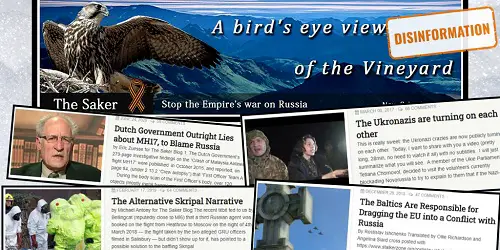
The Saker blog - "Stop the Empire's War on Russia"
The tagline "Stop the Empire's War on Russia" refers to the hegemony of the United States (the "Empire"), which is claimed to be at war with Russia, implying that Russia is a victim of aggression, not an aggressor itself. We also see a few screenshots referring to the Malaysian Airlines flight MH17, which was shot down in 2014 by a Buk surface-to-air missile launched from pro-Russian separatist-controlled territory in Ukraine; an item about "Ukronazis"; one about the poisoning of former Russian intelligence officer Sergej Skripal and his daughter in 2018; and another item about the Baltics "dragging the EU into a conflict with Russia". Obviously, this a a Russian propaganda media outlet pure and simple, where Russia is always innocent, pure and eternal (following Timothy Snyder's phraseology) and threatened by foreign powers or falsely accused of multiple crimes. The EUvsDisinfo website carries an article about this blog headed "The Saker – Blind Loyalty, Disguised as Defiance".[4] It summarizes its agenda:
The Saker of the Vineyard is a blog by a retired Swiss Red Cross officer, residing in Florida and defending Russia against an enigmatic Empire. The Saker has become a franchise for an international network of pro-Kremlin outlets, with branches in German, Italy, Latin America, and Russia. A Saker is a sort of falcon, falco cherrug, endemic to the steppes of Eurasia. The name of the blog is an anagram of the blogger’s name. Now, Dillard is also defiant towards the United States and its foreign policy track record of invading other countries—and rightly so. At the same time he seems to have a huge and fatal blind spot towards Russia and Putin's agenda. In the said essay he fullly goes along with Putin's narrative, in which Putin condemns the West as "Satanic" and evil, and ends with a reference to Orthodox Christianity, to which Raevsky comments: "It brings this entire war into the realm of a 'just war' fought for profound spiritual reasons, not just money or power." Now since when are holy wars an example of "profound spirituality", I would like to ask? The Russian patriarch Kirill recently said that Russian soldiers who died in combat would go straight to heaven.[5] This bodes poorly for any balanced and reasonable analysis of the current conflict. 'Like-minded people'Dillard makes a curious and telling comment when Putin briefly mentions the support he gets from Western "like-minded people":
While Putin's speech is a blunt and powerful condemnation of the West, he is not unaware of the strengths of Western society and culture. He says, Where exactly does Putin show awareness of the strengths of Western society and culture? What does Putin actually know about democracy, where politicians can be voted in or out, as is the case in Ukraine, but never in Russia? Given his characterization of Western society is full of platitudes such as decadent and weak, I have looked in vain for a fair assessment of what Western values are in their purest form (and not in their exaggerated form, thus strawmanning the West). No, the phrase "like-minded people in Europe and the United States" most probably refers to the various extreme-right wing radical political parties that see Vladimir Putin as their hero and strongman. 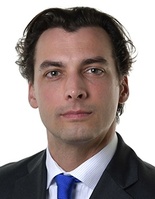 Thierry Baudet As a clear example of such a Russia-friendly movement we can point to Dutch author and politician Thierry Baudet, founder of the (ironically named) Forum for Democracy. I say "ironically" for Baudet is not known for his engagement with his colleague-members of Parliament. In fact, he recently told an interviewer he "looks down on these morons". During one of his rambling and conspirational speeches in the Parliament the complete cabinet walked out of the room when he implied that Sigrid Kaag, minister of finance, was a spy because she spent some years at the St Anthony's College in Oxford. Ironically, again, his own director of Forum for Democracy International John Laughland studied there as well (on the subject of the philosophy of J.W.F von Schelling). He thinks Trump was a gift from God and Putin is a virile hero and defender of Western(?) civilization. He is pro-Russian, and has said that the 2022 war in Ukraine is the fault of the West. He hopes "Putin will win". A few years ago Baudet met with ultra-reactionary Aleksandr Dugin, one of Putin's ideologues, where Dugin stated: "Baudet is a ticket to the future." Baudet is also a Covid-denier and author of the best-selling book Het Corona-Bedrog (Amsterdam Books, the English translation The Covid Conspiracy is prefaced by none other than Steve Bannon). Not to be confused with the non-best-selling The Corona Conspiracy of course. My review on Twitter of Baudet's book received 150.000 views. 'Some degree of objectivity'
"Is Putin's position balanced? No, of course not. It is highly partisan. But one doesn't read it with the expectation of a balanced perspective." (Dillard)
Dillard continues: However this is minor counterpoint to the direct and detailed counter-attack on Western values, culture, society, history, economy, media, morality, and spirituality that Putin levels. Is Putin's position balanced? No, of course not. It is highly partisan. But one doesn't read it with the expectation of a balanced perspective. If you want the other side of Putin's arguments, just look at the mainstream narratives that we are deluged with day in and day out. We listen to Putin's perspective not because it is objective, since it is not, but in order to balance the mainstream narrative and groupthink that saturates our media, so as to arrive at some degree of objectivity that includes and then transcends both. Where Dillard seems strong and even enthusiastic in presenting the Putin perspective, he seems surprisingly weak when it comes to arriving at "some degree of objectivity"—let alone a truly balanced integration. He pays lip service to the Western perspective, or explicitly says he doesn't want to engage in virtue signalling (let alone fully admitting and specifying Putins perspective is terribly one-sided in its own right and grotesquely misreads both the Western and the Ukrainian points of view). To get more specific, Dillard adds: Here we see the stark differentiation in worldview. The prevailing Western narrative is one of democracy vs. authoritarianism, a formulation emphasizing a conflict between freedom and rights vs subjugation and repression. The prevailing narrative of Russia and the Global South is one of sovereignty vs. globalization, emphasizing national autonomy vs. a mono-polar, hegemonic world. Putin's position is that, although the West affirms sovereignty, in practice it requires the subordination of nations to its dictates. We might add: although Russia affirms national sovereignty, in practice this doesn't apply to Ukraine, which can be erased from the map as long as it doesn't follow Russian dictates. Putin makes much of the Western history of colonialism, but forgets to mention that Russia, not having over-seas colonies, invaded almost any neighbouring country it could lay its hand on over the centuries. Again, we need to reach some level of objectivity here as well. Annexation is just Russia's middle name. The four recently annexed/liberated Ukrainian territories are only the latest in a centuries long row.[6]
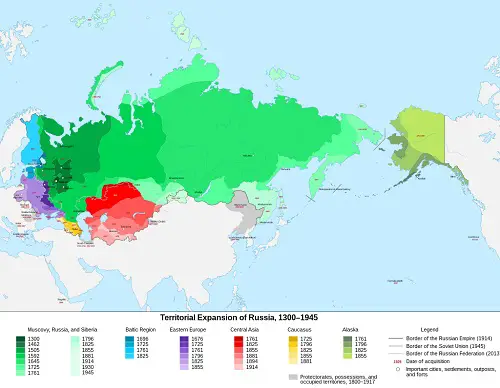
The borders of Russia changed through military conquests and by ideological and political unions in the course of over five centuries (1533–present).
And as to Putins accusation that the West is only interested in looting its colonies, one might ask how much of the revenues of the Russian oil and gas industry actually benefits the Russian population and how much ends up in the pockets of Putin and his circle of oligarchs? Did Putin care to mention how the Russian population has suffered under the Tsars, the Soviet Union and his own dictatorial regime? 'An Angry Taxi Driver'In the Guardian Putin's annexation speech was humoristically characterized as "more angry taxi driver than head of state." Having gone through the transcript of the speech myself, I was struck by the inconsistencies and hypocrisy. Putin sharply condemns the more excentric Western notions about gender and sexuality and the Woke mentality in general, which would fall under the category of the Mean Green Meme. But when he rails against the shadow side of Western history, especially its ages of colonialism, he fails to understand that it is precisely this Green meme in Western culture that has sharply criticized colonialism. Where is the comparable critical reading of Russian history, for that matter? And when he argues that the West violates the important principles of the integrity of nations, one is tempted to ask: what about Ukraine's integrity as a nation? Or is this a case of: all nations are sovereign, but some more than others, paraphrasing George Orwell? And when Putin triumphantly mentions that the people in the four annexed areas have voted to belong to Russia, in the makeshift referenda, one is tempted to recall that even in these Eastern Ukrainian provinces over 80% voted for independence from Russia in 1991 (Crimea being the exception, but even there it was a 50/50 vote).
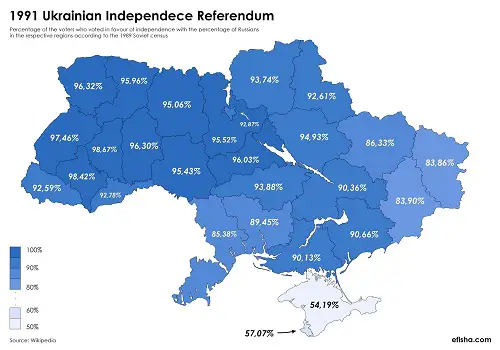 True, this was 30 years ago, but in the meantime a whole new younger generation has been raised in post-Soviet Ukraine, and the desire for freedom and democracy will be even stronger among the younger generation. And here's the percentage of Russians in Ukraine in 1989. As you can see, the two Donbas areas have the highest percentage, but still below 50%. That Putin has taken the two southern regions as well may be understandable for geostrategic reasons (he can now connect to the Crimea over land), but I doubt that its population consented with this land grab.
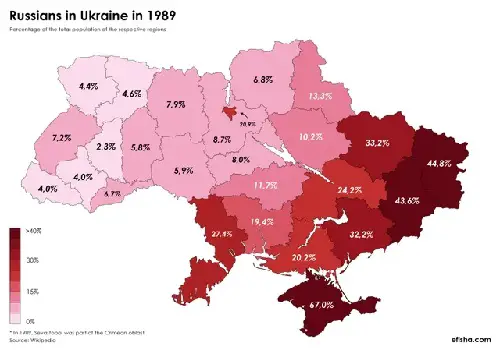
But the height of hypocrisy is when Putin gives the following threat/invitation: We call on the Kiev regime to immediately cease fire and all hostilities; to end the war it unleashed back in 2014 and return to the negotiating table. We are ready for this, as we have said more than once. But the choice of the people in Donetsk, Lugansk, Zaporozhye and Kherson will not be discussed. The decision has been made, and Russia will not betray it. (Applause.) Kiev's current authorities should respect this free expression of the people's will; there is no other way. This is the only way to peace.[7] One wonders: what else is there to negotiate except the land grab? What about "the people's will" of the Ukrainian population? What about ceasing all Russian hostilities? Putin feels confident that he has now secured his New Russia territory, even though its borders are still under dispute and heavily contested on the battlefield. It is at least good to read that Putin made this promise: "We will definitely rebuild the destroyed cities and towns, the residential buildings, schools, hospitals, theatres and museums. We will restore and develop industrial enterprises, factories, infrastructure, as well as the social security, pension, healthcare and education systems."[7] Does not really sound to me like any military targets... collateral damage of the Russian invasion? Finding a BalanceHow do we integrate the Western/Northern and the Russian/Southern perspectives, if that can be done at all? Does integralism offer any pointers here? After the Thesis of the Main Stream Western media and the Antithesis of Russian War Propaganda, what would a true Synthesis look like? What are the main points of contention?
Democracy vs autocracy refers to a system of governance within a given country. Sovereignty vs. globalism refers to the power relationship between different countries. So that is not much of a choice between two alternatives. Ideally there should be no oppression within or between countries. Period. People should be free to vote for their own government, and countries should be free to join any form of cooperation they might consider useful. Of course, in the real world, more than a third of the world's population lives under authoritarian rule while just 6.4% enjoy full democracy. And peaceful relationships between countries are far from settled, although the EU has been a good example of bringing peace through commerce. In this discussion, "globalization" is an ambiguous term to use. In integral speak, development moves from egocentric to ethnocentric to worldcentric. At the end of the day we are all citizens of one planet Earth. But anti-globalists use the term to refer to the US "Empire", that rules hegemonically over the mono-polar world. The suggested solution of a multi-polar world would be a step ahead, just as former Soviet Union countries now prefer to live independently. But in the future multiple forms of cooperation between countries will lead to a global network of states. Those who oppose the EU as a trans-national framework and argue for a return to nationalism (and bilateral relations between countries) represent a step back. Afraid to lose their national identiy within these larger contexts, they focus on what makes their own country so unique. In my opinion, globalization is there to stay. Democracy is there to stay as well. The trouble with autocratic systems is that they went straigth from feodalism to communism, skipping the intermediate liberal stage. That's why Russia and China bascially lack a civic society of individual members. Those who oppose globalization and argue for nationalism are often deluded by a conservative-romantic longing for the past. Of course, younger nations such as Ukraine have every reason to be nationalistic, as opposed to giving in to the demands of Russia as imperialistic power. But their wish to join the EU (and NATO perhaps sooner than later) also testifies to their modernity. Incidentally, in 2016 Thierry Baudet was also involved in a Dutch referendum about Ukraine signing an Association Agreement with the EU. As one of 29(!) European countries The Netherlands voted against this. The Agreement went along anyways.[8] In a world where geopolitics rules the day, Europe cannot be other than on its way to becoming a player by itself, instead of being pushed around by the US, Russia or China. A broad worldwide transition from a unipolar/hegemonic world to a multi-polar one, recognizing multiple global powers, seems rational to me. But that requires each of these players to respect the values of their competitors, and that seems to be the hardest goal to reach. Where the West may have misread Russia, Russia itself has completely misread Ukraine and the West's willingness to support that country on its way to a true and viable democracy. NOTES
Thierry Baudet: 'I am really happy with this because finally a front has been opened, there's a front against the globalists. I hope Russia will win.' (15:00)
Comment Form is loading comments...
|